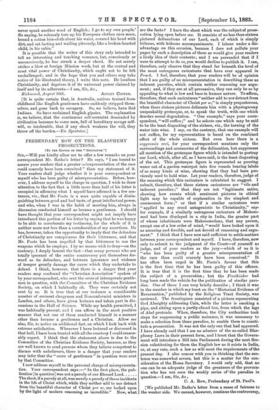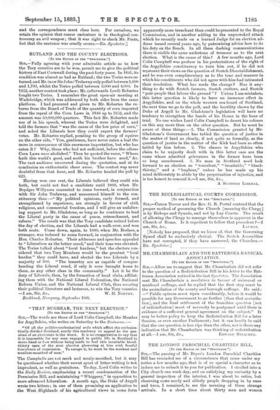PREBENDARY ROW ON THE BLASPHEMY PROSECUTIONS. [To THE EDITOR OF
TH8 " SPECTATOR."] SIR,—Will you kindly allow me to offer a few remarks on your correspondent Mr. Batho's letter P He says, " I am bound to assure your readers that a greater misrepresentation of the case could scarcely have been conceived " than my statement of it.
Your readers shall judge whether it is your correspondent or myself who has been guilty of misrepresentation. Before, how- ever, I address myself to the charge in question, I wish to draw attention to the fact that a little more than half of his letter is occupied in affirming what I myself have affirmed in a few sen- tences, viz., that Mr. Foote is a man quite capable of distin- guishing between good and bad taste, of great intellectual power, and who, when I was in the habit of meeting him, always in discussion conducted himself as became a gentleman. I should have thought that your correspondent might not inaptly have introduced this portion of his letter by saying that he was happy to be able to corroborate my testimony, for the whole of it is neither more nor less than a corroboration of my assertions. He has, however, taken the opportunity to imply that the defenders of Christianity are conspicuous for their bitterness, and that Mr. Foote has been impelled by that bitterness to use the weapons which he employs. I by no means wish to deny—on the contrary, I deeply lament the fact—that many persons who are totally- ignorant of the entire controversy put themselves for- ward as its defenders, and between ignorance and violence of temper greatly damage the cause which they undertake to defend. I think, however, that there is a danger that your readers may confound the " Christian Association" spoken of by your correspondent, who sent the score of intemperate gentle- men in question, with the Committee of the Christian Evidence Society, on which I habitually sit. They were certainly not sent by us. It is true that at our instance a considerable number of eminent clergymen and Nonconformist ministers in London, and others, have given lectures and taken part in dis- cussions in the Hall of Science. While my health permitted, I was habitually present, and I can affirm in the most positive manner that not one of these conducted himself in a manner other than became a gentleman and a Christian. Allow me also, Sir, to notice an additional fact, on which I look back with extreme satisfaction. Whenever I have lectured or discussed in that hall, I have been treated with all the courtesy I could reason- ably expect. I think that the statement above is due to the Committee of the Christian Evidence Society, because, as they are well known to send persons whom they believe competent to discuss with unbelievers, there is a danger that your readers may infer that the "score of gentlemen" in question were sent by that Committee.
I now address myself to the personal charge of misrepresenta- tion. Your correspondent says :—" In the first place, the pub- lication [in question] was not a parody of our Blessed Lord The sheet, if a parody at all, was merely a parody of those incidents in the life of Christ which, while they neither add to nor detract from the beautiful character of Christ per se, are looked upon by the light of modern reasoning as incredible." Now, what are the facts ? I have the sheet which was the subject of prose- cution lying open before me. It consists of no less than sixteen pictured delineations of our Lord, each of which is simply hideous, with hideous accompaniments. I labour under a dis- advantage on this occasion, because I dare not pollute your pages by such a description of them as would give your readers a lively idea of their contents ; and I am persuaded that if I were to attempt to do so, you would decline to publish it. I can, therefore, only observe that they stand far beneath the level of the most outrageous caricatures that have ever appeared in Punch. I feel, therefore, that your readers will be of opinion that I am guilty of no misrepresentation in describing these as indecent parodies, which contain neither reasoning nor argu- ment; and, if they are at all persuasive, they can only be so by appealing to what is low and base in human nature. To affirm, therefore, that such caricatures "neither add to nor detract from the beautiful character of Christ per se," is simply preposterous, when these sixteen pictures delineate him with a physiognomy unspeakably grotesque, or, to speak the truth, with one which denotes moral degradation. " One example," says your corre- spondent, "will suffice ;" and he selects one which may be said to be the least disgusting of the sixteen, viz., the turning of the water into wine. I say, on the contrary, that one example will not suffice, for my representation is based on the combined effect of the whole sixteen. But even here there is a suppressio veri, for your correspondent mentions only the surroundings and accessories of the delineation, but suppresses all mention of the grotesque figure which is intended to portray our Lord, which, after all, as I have said, is the least disgusting of the set. This grotesque figure is represented as pouring water out of a garden waterpot into five vessels bearing labels of as many kinds of wine, showing that they had been pre- viously used to hold wine. Let your readers, therefore, judge of the meaning which this caricature is calculated to suggest. I submit, therefore, that these sixteen caricatures are "vile and indecent parodies ;" that they are not "legitimate satire, showing how events which sentiment pictures in ethical light may be capable of explanation in the simplest and commonest form ;" or that if a similar caricature were " applied to any creed antagonistic to Christianity," say. for example, if a similarly outrageous caricature of Mahom- med had been displayed in a city in India, the greater part of whose inhabitants were Mahommedans, that any person, except one of a low order of mind, " would have looked upon it as amusing and forcible, and not devoid of reasoning and argu- ment." I think that I have now said sufficient to settle matters between your correspondent and myself. I have, therefore, now only to submit to the judgment of the Court—of yourself as judge, and of your readers as the jury—which of us it is "who has been guilty of a greater misrepresentation of the case than could scarcely have been conceived." It has often been urged in Mr. Foote's favour that this is the first time that he has been • guilty of this offence. It is true that it is the first time that he has been made the subject of a prosecution ; but the Freethinker had long been made the vehicle for the publication of similar paro- dies. One of these I can very briefly describe ; I think it was in the nnmber in which my tract on the "Historical Evidence of Resurrection," published by the Religious Tract Society, was reviewed. The frontispiece consisted of a picture representing God Almighty addressing Cain, while the latter is smoking a pipe, and sitting upon a partly-closed box, from which the legs of Abel protrude. When, therefore, the City authorities took steps for suppressing a public nuisance, it was necessary to make a selection from these parodies, to enable them to consti- tute a prosecution. It was not the only one that had appeared. I have already said that I am no admirer of the so-called Blas- phemy Laws in their present form, and I trust that the Govern- ment will introduce a Bill into Parliament during the next Ses- sion substituting for them the English law as it exists in India, or, at any rate, such a law as will meet the requirements of the present day. I also concur with you in thinking that the sen- tence was somewhat severe, but this is a matter for the con- sideration of the Home Secretary. I would only add, that no one can be an adequate judge of the greatness of the provoca- tion who has not seen the weekly series or the parodies in question.—I am, Sir, Ssc , C. A. Row, Prebendary of St. Paul's.
[We published Mr. Batho's letter from a sense of fairness to the weaker aide. We cannot, however, continue the controversy,
and the correspondence most close here. For ourselves, we retain the opinion that coarse caricature is in theological con- troversy an evil weapon ; that it was right to check Mr. Foote, but that the sentence was cruelly severe.—ED. Spectator.]



































 Previous page
Previous page